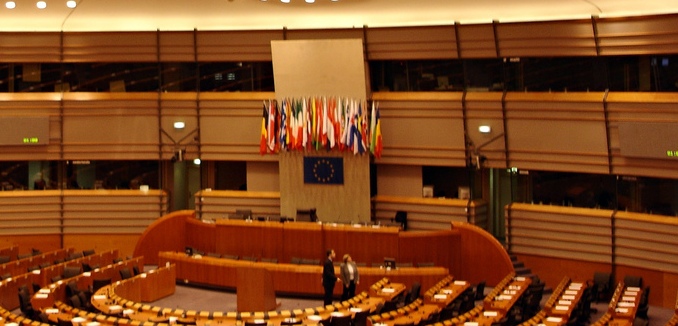David Simha, the president of the Israeli-Palestinian Chamber of Commerce and Industry, said on Wednesday that the European Union’s decision to label goods produced by Israeli companies that operate beyond the 1949 armistice lines will most likely hurt the thousands of Palestinians these enterprises employ, rather than have a perceptible effect on the Israeli economy.
His comments were made during a conference call hosted by The Israel Project, a recording of which is embedded below. The Israel Project publishes The Tower.
During the call, Simha explained that while products from Israeli settlements amount to only about 0.1 percent of Israeli exports, meaning that any boycotts of these goods would not have a significant economic impact on Israel, the labeling guidelines would conversely jeopardize the livelihoods of Palestinians if they caused the businesses that employ them to lose money.
It will effect on the other side, to my opinion, the Palestinian economy because there are thousands of workers working in those factories and if those people will not get orders … the owners will have to fire those Palestinians and this is a shame.
At the conclusion of the call, Simha was asked if he believed that similar labeling initiatives would extend beyond Europe. He answered that he did not, but noted that the EU’s decision played into the narrative of anti-Israel boycotters.
No, no, I think it’s part of the activities of Europe in this and I think it’s a mistake. I think it is again playing in the hands of the BDS. And BDS is trying to do a lot more than that. And I think for the BDS they will be very happy tonight because they will that they achieved the first stage. And if you go deep inside the way that the BDS is acting sometimes or is talking sometimes it’s not only products … I would say they are not … recognizing Israel, let’s put it this way.
The New York Times, in an earlier version of its report on the guidelines, included Simha’s comments about the labeling having little effect on the Israeli economy. Avi Roeh, chairman of the Yesha Council, told the Times that businesses where Israelis and Palestinians work together are “the gold standard for peace” and shouldn’t be boycotted. He added, “If the E.U. wants to see real coexistence, they should come and visit Judea and Samaria, then it would be clear they are labeling the wrong people.”
The Times also quoted Vered Ben-Saadon, the granddaughter of a Holocaust survivor and co-owner of a winery in the West Bank, who said that the decision recalled past European history. “This is how it started 70 years ago, by marking people, products, Jewish stores.”
The comments by both Simha and Roeh were removed from the Times‘ latest version of the report.
On Monday, a bipartisan group of 36 senators published a letter urging the EU to reconsider its labeling policy. On Tuesday, Sen. Marco Rubio (R – Fla.), one of the letter’s signatories, wrote that Palestinians “who work cooperatively with Israelis” are among those who are likely to be hurt by the initiative.
In a paper (.pdf) published this past August, legal scholars Avi Bell and Eugene Kontorovich emphasized the discriminatory nature of the EU’s decision.
There are about 200 territorial sovereignty disputes worldwide, in many cases of which the EU does not accept sovereignty claims of the states which administer the territory in question. Among these territories are Western Sahara (controlled by Morocco), Kashmir (controlled in dif ferent parts by India, Pakistan and China), and many others. In many of these areas, the controlling state allows or actively encourages its citizens to live in the territory, in practices that are far more intrusive than those identified by Europe as “settlements” when Israel is involved. Despite the ubiquity of territorial disagreements and settlement practices, the EU has never unilaterally adopted a regulation requiring geographic labelling contrary to the exporting country’s certificate of origination.
[Photo: Xaf / Flickr ]




